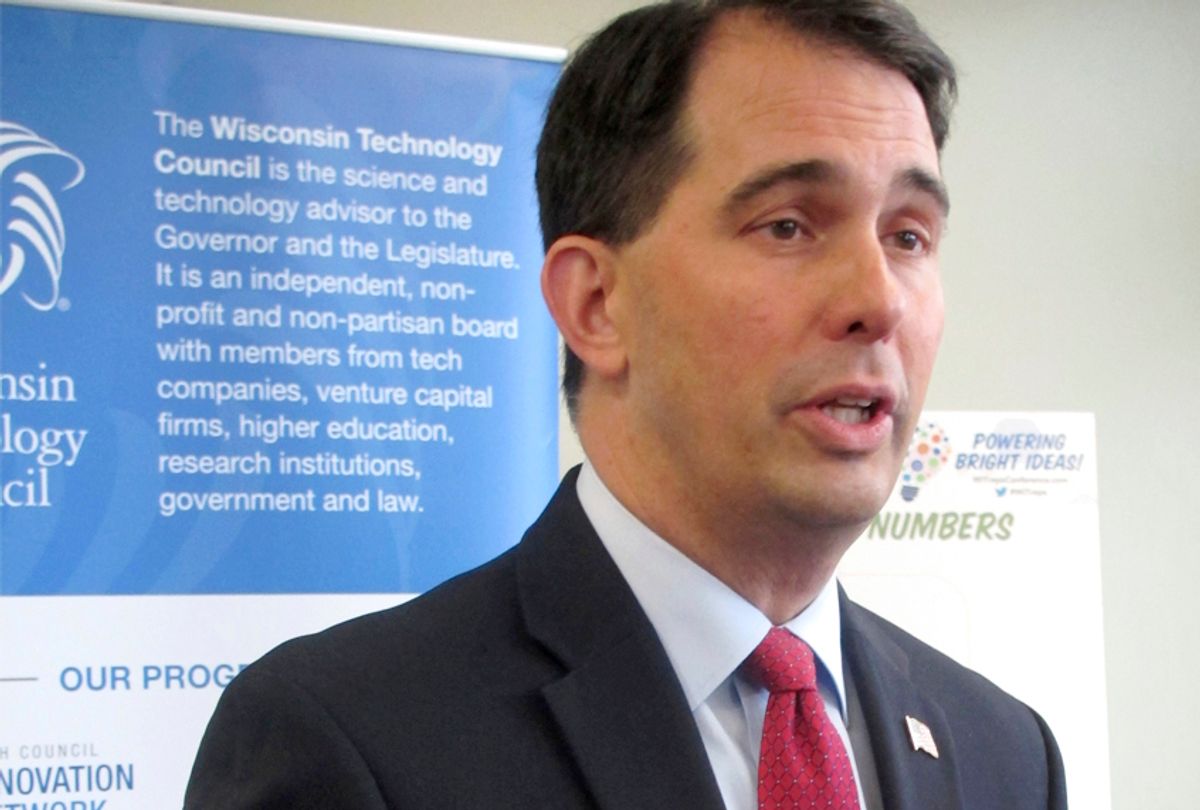Gov. Scott Walker of Wisconsin was the rising star of the Republican Party and believed to be destined for the White House just four years ago. Instead, he may be forced into an early retirement from politics.
An NBC News/Marist poll released Thursday shows Walker down a whopping 10 points against his Democratic challenger, state schools superintendent Tony Evers. Evers leads by 53 to 43 percent among likely voters, the survey reported.
Fifty-four percent of respondents said they had a negative view of Walker as governor, even more than the 50 percent who said they disapproved of the job President Donald Trump is doing.
Two earlier polls released in September also showed Evers up by 4 to 7 points, though a Marquette Law School poll muddled the picture this week after showing Walker with a narrow one-point lead, 47 to 46 percent.
All of the polls show a big lead for incumbent Democratic Sen. Tammy Baldwin, who is also on the ballot this November. Democrats have looked strong in district-wide elections in the Badger State since Trump took office.
Walker losing re-election, perhaps by a large margin, would makes sense in a year where Democrats appear energized to rebuke the ruling party, especially in a state Trump won by about 23,000 votes, or 0.8 percent. Trump has similar sagging approval numbers in nearby states. His approval has fallen to 45 percent in Pennsylvania, 42 percent in Michigan and 40 percent in Minnesota -- all states he carried in 2016.
But Walker is no generic swing-state Republican. He won three elections in a state that generally tilts Democratic despite a very conservative Tea Party-inspired platform, including winning a recall election in 2012 after he decimated public unions in the state. He has overseen an aggressive gerrymander of the state that was challenged before the Supreme Court, the creation of a voter ID law that reportedly disenfranchised 200,000 people, and the slashing of public education funds.
His conservatism in a blue state endeared him to the Republican Party and the Koch brothers. By 2014, conservatives like the Weekly Standard's Bill Kristol were already picking running mates for Walker's 2016 presidential bid.
It didn't go well. Walker, who was the last Republican to enter the crowded GOP field, became the first to drop out after just 70 days.
Walker's decline tracks closely with fellow former Republican governors Bobby Jindal of Louisiana and Sam Brownback of Kansas, who imposed hard-right fiscal policies that endeared them to national conservatives, but resulted in disaster for their states and their careers.
Jindal, another conservative darling touted as a presidential contender since 2012, inherited a $1 billion budget surplus when he took over the state, and quickly slashed taxes while cutting health care, education and the state workforce. After two terms, Louisiana had a record $1.6 billion budget deficit. Not only did Jindal finish his doomed 2016 presidential bid while polling at less than 1 percent, he finished his governorship with a 20 percent approval rating in his own state. Democrat John Bel Edwards defeated Republican Sen. David Vitter with 56 percent of the vote to replace him.
Brownback, who unsuccessfully ran for the GOP presidential nomination in 2008, found similar success with ultra-conservative policies in Kansas. Brownback took the Republican idea of trickle-down economics to the extreme, overseeing a massive tax slash that resulted in a $700 million revenue loss in its very first year, a potential school shutdown and massive education job cuts, but none of the explosive job growth he had promised. Brownback won his election in 2010 with 63 percent of the vote, but ended his governorship with a 66 percent disapproval rating, resigning to serve in the Trump administration as ambassador-at-large for "international religious freedom."
Walker now risks becoming the latest Republican cautionary tale, leaving the state with staggering deficits on what may be his final exit.

Shares